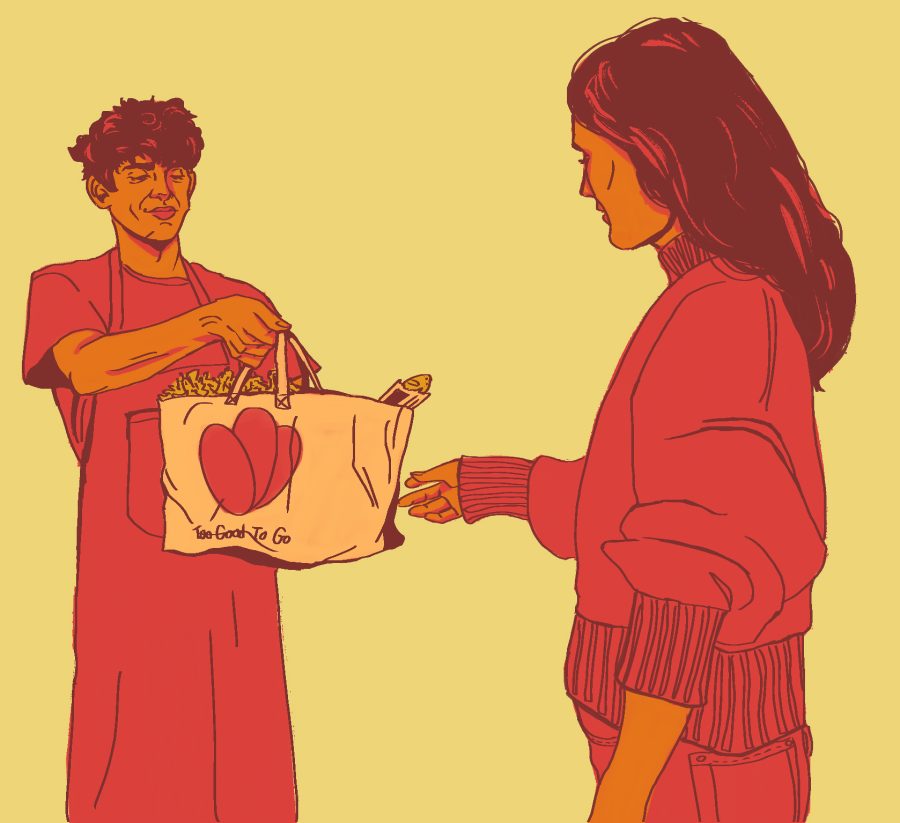Food waste is a big concern in Boston, ranging from small cafes to high-end restaurants. City officials and restaurant owners are developing innovative ways, like surprise food bags, to address the issue. OAK Long Bar and Kitchen at Fairmont Copley Plaza partnered with an app called Too Good To Go, through which they offer food bags made from the leftovers at a fraction of the original price. At the end of the breakfast and dinner services, a bag is curated by the chef and the team. The packaged food is then offered to the customers and they can come pick up their ‘surprise bag.’
Chef Zaid Khan and his team from OAK Long Bar and Kitchen are personally working on this initiative to reduce food waste and minimize the restaurant’s carbon footprint. “It’s very user-friendly. The attraction is that this brings people who are interested in contributing to sustainability and lowering food waste to us,” Chef Khan said, commenting on the initiative.
Three bags are created in the restaurant following the breakfast and dinner services and are reserved for the customers who place their orders through the Too Good To Go app the fastest. The customers then go to the restaurant and pick up their surprise bag. Items in the breakfast food bag could range from croissants to fresh fruits and pastries, and the dinner bag could be a combination of chicken, clam chowder, etc. Each bag’s price is around $7, which is one-third of the original price.
Too Good To Go app is based in Copenhagen, Denmark, and is a convenient mobile app that connects customers with restaurants and stores with surplus food they can get for a low price. As the app’s website informs, one-third of food produced is wasted globally. And to fix this food waste problem and reduce the carbon footprint, the app is promoting initiatives like surprise bags. Restaurants like Early, Cava, Blue Bottle Coffee and more, have partnered with the app to support the cause.
The Boston City Government has also initiated several programs to control food waste. The city now offers a curbside food collection service to the city residents. Partnership with the Boston farmers market has also been beneficial in bringing food waste drop-off locations to more Boston communities.
UMass Boston has strongly endorsed the idea of zero-waste and eco-friendly dining options. The information fetched through the UMass Boston website suggests that the university has a robust composting system, which composts food waste, organics and greenhouse waste. The university composts more than 30,000 lbs. of waste per year from dining halls, cafes and gardens.
Julia Olszewski, Environmental Studies and Sustainability and Political Science major, commented on the present composting system at UMass Boston. To her observation, “The composting system at UMass Boston seems more like a scam than a real effort. While I don’t know what they do in the dining hall connected to the residence halls, the separated waste bins in the food court don’t stay separated. I’ve seen them combine compost, recycling, and trash into one bin and throw it all away even though students think they are actually making a difference by separating trash.”
Colin Tsuboi, a freshman studying international relations living at the east residence hall at UMass Boston, commented on the food waste situation at the dining commons. “Personally, I have seen a lot of people dumping a lot of food into the compost bin. The compost bins are pretty full, and I think that a lot of food is wasted. I don’t know what happens after that in terms of the composting process carried out,” Tsuboi said.
A Concord-based startup is helping generate clean power using supermarket food waste. Ryan Begin founded the startup Divert to help grocery stores reduce waste by 50 percent by 2030, as outlined by the United Nations Sustainable Development goals. Grocery stores deliver the waste and expired products to Divert, which the company sorts using optical scanning technology. Good quality and edible food items are sent to pantries and waste is used to generate clean, renewable energy. Food waste isn’t a new challenge, but is a pressing one contributing a lot to greenhouse gas emissions. As a student, it is highly encouraged to pursue small, sustainable habits.

